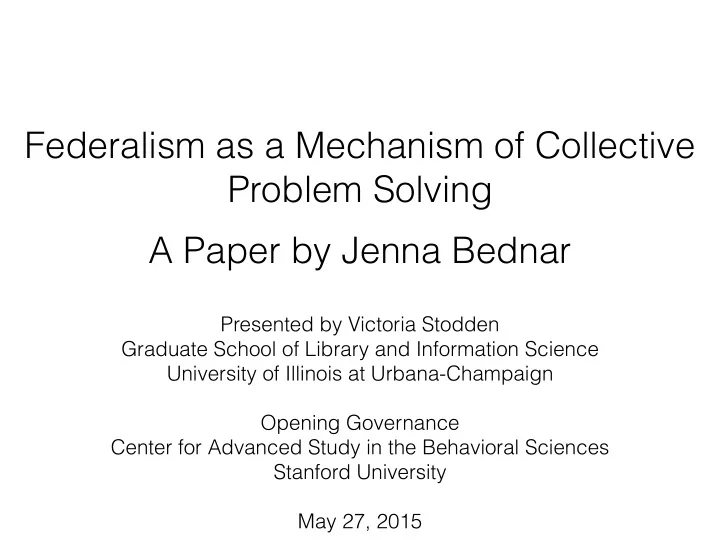

Federalism as a Mechanism of Collective Problem Solving A Paper by Jenna Bednar Presented by Victoria Stodden Graduate School of Library and Information Science University of Illinois at Urbana-Champaign Opening Governance Center for Advanced Study in the Behavioral Sciences Stanford University May 27, 2015
Methods as a Frame 1. Assertion: Process is an important distinguishing feature of collective decision making (mob rule vs wise crowd). 2. Democratic governance as an exemplar: i. methods to generate new ideas ii. choose important ideas iii. method to propagate ideas iv. avoid madness (this is postulated as ad hoc)
Assertions • Democracy is about policy choice, and it’s the complexity of the policy choice that calls for collective decision making. • Challenge is converting individually held data into knowledge for the benefit of society. ➡ Use of Social Welfare Function as metric, but this is inherent unmeasurable and even tough to define. ➡ This also seems to beg for a computational approach, at least in theory..
Innovation, Selection, and Reproduction Innovation, selection, and reproduction as key feature of adaptive systems: • Innovation : crowds can dampen consideration of new ideas, but minority testbeds can surface and test new ideas (like state level marijuana laws). • Selection : Social Choice Theory to select ideas; Positive Political Theory fills in gaps: accounting for individual incentives in group decision making. • Reproduction: Federalism can dampen to adoption of bad but fashionable ideas via a layered process of modularity (but getting the level of damping right is hard). ➡ Can we empirically test the effectiveness or value of social choice theory? ➡ Does PPT incorporate notions of institutional capture and its influence on selection?
Suggestibility, Contagion, and Irresponsibility • Suggestibility, contagion, and irresponsibility arise from LeBon (1895) to describe individual behavior in crowds. • postulates a positive feedback loop applying reactions during crowd choice. • But what aggregation mechanism do the groups use? • Can a democracy use these theories for institution design that encourages wisdom? ➡ Recurrent problem: what is “good”?
Reactions i. Are the methods generating new ideas, or really only ways to select or propagate ideas? ii. Are ideas being chosen at all? or is it tactics? or principles? are methods themselves being chosen? iii. Are methods to propagate ideas really at such an abstract level? What about law creation the Hill? vs development of party ideology at the plank level. iv. Avoiding madness [Democracy as avoidance of extremes]
Recommend
More recommend